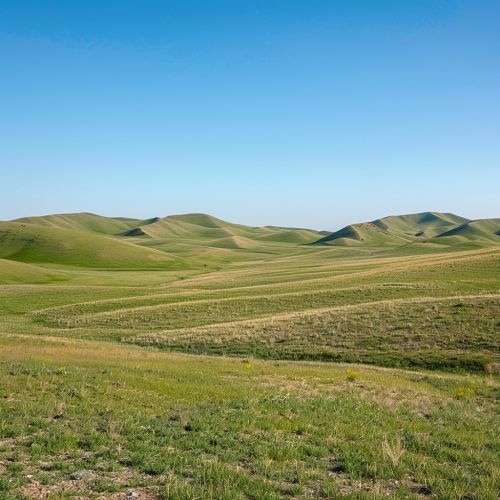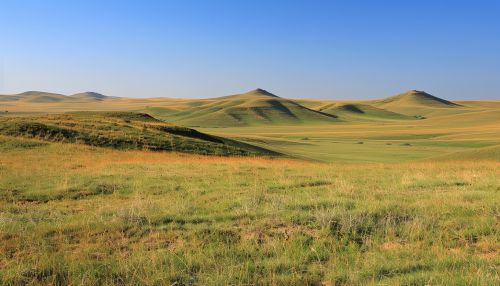History of Kazakhstan
Prehistoric and Ancient Kazakhstan
Kazakhstan's history dates back to the Paleolithic era, with evidence of early human habitation found in the region. Archaeological findings suggest that the area was inhabited by nomadic tribes who engaged in hunting and gathering. The Bronze Age saw the emergence of the Andronovo culture, which is characterized by its distinctive pottery and burial practices.
The Iron Age brought the rise of the Saka and Wusun tribes, who were known for their horse-riding skills and intricate metalwork. These tribes played a significant role in the development of the region, establishing trade routes and interacting with neighboring civilizations.
The Turkic Khaganates
In the early medieval period, the territory of modern-day Kazakhstan was part of the vast Turkic Khaganates. The Göktürks, who established the first Turkic Khaganate in the 6th century, were instrumental in shaping the cultural and political landscape of Central Asia. The Khaganate's influence extended from the Altai Mountains to the Caspian Sea, and it served as a crucial link between the East and the West.
The fall of the Göktürk Khaganate in the 8th century led to the rise of the Karluk and Oghuz tribes, who continued to dominate the region. The Karluks played a pivotal role in the formation of the Karakhanid Khanate, which became a major political entity in Central Asia.
The Mongol Invasion and the Golden Horde
The 13th century marked a significant turning point in Kazakhstan's history with the arrival of the Mongol Empire. Genghis Khan's conquests brought the region under Mongol control, leading to the establishment of the Golden Horde. The Golden Horde, a successor state of the Mongol Empire, ruled over much of the Eurasian steppes, including Kazakhstan.
The Mongol rule had a profound impact on the region, introducing new administrative practices and facilitating trade along the Silk Road. The decline of the Golden Horde in the 15th century paved the way for the emergence of the Kazakh Khanate.
The Kazakh Khanate
The Kazakh Khanate was founded in the mid-15th century by Janibek and Kerei, descendants of the Mongol rulers. The Khanate quickly expanded its territory, encompassing much of modern-day Kazakhstan. The Kazakh Khanate was divided into three main regions, known as the "Zhuzes": the Great, Middle, and Little Zhuz.
The Kazakh Khanate played a crucial role in the region's history, engaging in trade and diplomacy with neighboring states. The Khanate faced numerous challenges, including invasions by the Dzungar Khanate and internal strife. Despite these challenges, the Kazakh Khanate maintained its independence until the 18th century.
Russian Empire and Soviet Union
The 18th century saw the gradual incorporation of Kazakhstan into the Russian Empire. The Russian expansion into Central Asia was driven by the desire to secure trade routes and expand territorial control. By the mid-19th century, Kazakhstan was fully integrated into the Russian Empire, leading to significant social, economic, and cultural changes.
The Russian Revolution of 1917 and the subsequent civil war had a profound impact on Kazakhstan. The region became part of the Soviet Union, and the establishment of the Kazakh Soviet Socialist Republic in 1936 marked a new era in its history. The Soviet period brought industrialization, collectivization, and significant demographic changes, including the forced relocation of various ethnic groups.
Independence and Modern Kazakhstan
Kazakhstan declared its independence from the Soviet Union on December 16, 1991. The post-independence period was marked by significant political and economic reforms, aimed at transitioning from a centrally planned economy to a market-oriented one. Nursultan Nazarbayev, the first President of Kazakhstan, played a key role in shaping the country's modern identity.
Kazakhstan's strategic location and vast natural resources have made it a significant player on the global stage. The country has pursued a multi-vector foreign policy, balancing relations with major powers such as Russia, China, and the United States. Kazakhstan has also been an active participant in regional organizations, including the Eurasian Economic Union and the Shanghai Cooperation Organization.
Culture and Society
Kazakhstan's rich cultural heritage reflects its diverse history and the influence of various civilizations. The country is home to a wide range of ethnic groups, including Kazakhs, Russians, Uzbeks, and Ukrainians. The Kazakh language, along with Russian, is widely spoken and serves as an important aspect of national identity.
Traditional Kazakh culture is characterized by its nomadic heritage, with customs and practices that have been passed down through generations. Music, dance, and oral literature play a significant role in Kazakh culture, with instruments such as the dombra and kobyz being central to traditional music.
Economy and Development
Kazakhstan's economy is one of the largest in Central Asia, driven by its abundant natural resources, including oil, gas, and minerals. The country has implemented various economic reforms to attract foreign investment and diversify its economy. The development of the energy sector has been a key focus, with significant investments in oil and gas exploration and production.
In recent years, Kazakhstan has also prioritized the development of other sectors, such as agriculture, manufacturing, and services. The government has launched initiatives to promote innovation and technology, aiming to transform Kazakhstan into a knowledge-based economy.
See Also
- Silk Road
- Turkic Khaganates
- Golden Horde
- Kazakh Khanate
- Russian Empire
- Soviet Union
- Nursultan Nazarbayev
- Eurasian Economic Union
- Shanghai Cooperation Organization


